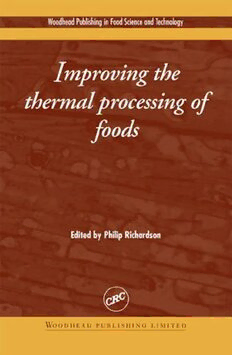
Improving the Thermal Processing of Foods PDF
529 Pages·2004·5.959 MB·English
Most books are stored in the elastic cloud where traffic is expensive. For this reason, we have a limit on daily download.
Preview Improving the Thermal Processing of Foods
Description:
The application of heat is both an important method of preserving foods and a means of developing texture, flavor and color. It has long been recognized that thermal technologies must ensure the safety of food without compromising food quality. Improving the thermal processing of foods summarizes key research both on improving particular thermal processing techniques and measuring their effectiveness. Part 1 examines how best to optimize thermal processes, with chapters addressing safety and quality, efficiency and productivity and the application of computational fluid dynamics. Part 2 focuses on developments in technologies for sterilization and pasteurization with chapters on modeling retort temperature control and developments in packaging, sous-vide and cook-chill processing. There are chapters covering continuous heat processing, including developments in tubular heat exchangers, aseptic processing and ohmic and air impingement heating. The fourth part considers the validation of thermal processes, modeling heat penetration curves, using data loggers and time-temperature integrators and other new measuring techniques. The final group of chapters detail methods of analyzing microbial inactivation in thermal processing and identifying and dealing with heat-resistant bacteria.
See more
The list of books you might like
Most books are stored in the elastic cloud where traffic is expensive. For this reason, we have a limit on daily download.
